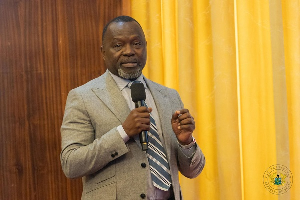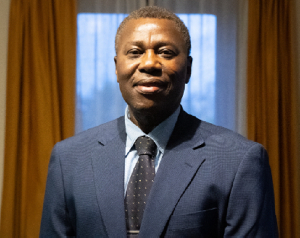AGC Returns A Dividend Of $1m To The Government Of Ghana – Is The Government Happy With The Company’s Performance?
About a month ago The Ghana Home Page reported in an article that, Ghana’s premier company, the Ashanti Goldfields Corporation’s (AGC) dividend to the Ghana Government this year was $1 million. If this is true, it represents a very disappointing outcome for Ghana. Through the Government of Ghana, the community has given AGC access to one of the nation’s most precious natural resources for wealth creation, to assist Ghana’s social and economic development. The AGC therefore has both a moral and economic responsibility to use the resource to optimum efficiency so as to provide world standard returns to the people of Ghana.About the Company
Information on the company’s website indicates that AGC’s mine at Obuasi has been in continual production for over 100 years. AGC’s main mine at Obuasi in the Ashanti Region is estimated to have proven and probable gold reserves of more than 20 million ounces. This makes the AGC’s operations in Ghana “one of the largest and richest gold mines in the world”.
It is also reported on the website that the Company’s total earnings in 2002 from its Ghanaian operations was $41.9 million. In the 2001 fiscal year the total earnings from the Ghana operations was $30.5 million. The website further reported that in 1994, the Government of Ghana, then the majority shareholder sold 20-25 percent of its interest in AGC in a share floatation, which was described as the “largest floatation ever organised by any gold mining company”.
As a shareholder in one of the largest and richest gold mining companies in the world, is the Government of Ghana happy with the returns the country is receiving from the use of one of the community’s most precious natural resources? The present Government and indeed the Parliament, comprises several highly educated individuals with international experience who are expected to have an understanding of, and appreciation for, assessing the performance of business enterprises based on global benchmarks.
One expects that given the caliber of the MPs in the present Parliament, the Government of Ghana is already in dialogue with AGC, and seeking an explanation for the low returns to the country. Similarly one would expect that the AGC’s own board, which also comprises several individuals with international business experience, is equally not happy with the company’s performance, and is taking positive steps to ensure immediate improvement.
As a multinational company, the AGC board and management should expect that the company’s financial performance would be benchmarked against international best practice. Without knowing the full details, it is reasonable for others outside the company to conclude based on the information available publicly that the AGC’s reported performance is less than average, compared with similar companies operating in the developed western world.
If a company of AGC’s size reported such low financial returns in the western world, shareholders as well as the government will be up in arms against the Company and its board. This should be no different for Ghana, particularly as the company’s management and board are reported to comprise highly talented and internationally experienced individuals.
The reported poor performance of the AGC could suggest two things: i.e. either the company is not an efficient gold producer, in which case it may not deserve to be given continued access to the community’s natural resource, or the company is not being managed properly. If the latter is true it is the responsibility of AGC’s Board to address whatever management problems exist in the company.
The community should not be expected to continue to place its precious natural resources in the hands of an entity, which may not be capable of maximizing value and wealth creation for its benefit. As a developing country, sustainable management and use of Ghana’s natural resources is one of the few viable options available to create wealth for socio-economic development. Based on the reported results and by any objective measure, the AGC may not be assisting adequately Ghana and its people in using its natural wealth for enhanced community development.
Some may argue that the company pays royalties for access to the resource, as well taxes to the Government of Ghana and salaries for its employees. While these other payments are important financial contributions to Ghana, the AGC is not unique in this respect. Similar multinational companies against which the AGC benchmarks itself also make these payments for their operations and yet report healthier financial outcomes.
With the recent corporate collapses in North America, Europe and Australia, the development and implementation of best practice corporate governance has become a major priority for governments globally. This should not be different for governments in developing countries. Companies and their boards have a fundamental responsibility to protect shareholders’ interests through continually enhancing value and wealth creation. This can only be achieved if poorly performing companies, both private and public, are held accountable in a transparent manner. The community has a right to know and be convinced that its elected representatives are indeed protecting their interests. To address this very issue in Australia, the Government has recently developed and published “Principles of good corporate governance and best practice recommendations, aimed at assisting companies to put in place accountability and control systems commensurate with the risks of commercial/financial achievement.
In summary the principles require that a company should:
- lay solid foundations for management and oversight;
- structure the board to add value;
- promote ethical and responsible decision-making;
- safeguard integrity in financial reporting;
- make timely and balanced disclosure;
- respect the rights of shareholders;
- recognize and manage risk;
- encourage enhanced performance;
- remunerate fairly and responsibly; and
- recognize the legitimate interests of shareholders.
One certainly hopes that the Government of Ghana is asking the right questions of the AGC and its board, and that before too long, an explanation from both the Government and the Company will be published about why the community should not be entitled to expect a better return than $1 million in dividends.
Director, Asumadu & Associates*

Views expressed by the author(s) do not necessarily reflect those of GhanaHomePage.














